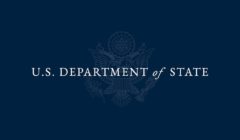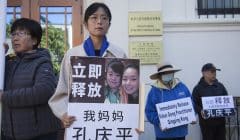Congressional-Executive Commission on China Holds Hearing on Forced Organ Harvesting

Congressional-Executive Commission on China hearing on March 20, 2024 (screenshot: CECC livestream)
On March 20, 2024, the bipartisan, bicameral Congressional-Executive Commission on China (CECC) held a hearing on forced organ harvesting of Chinese prisoners of conscience, including people who practice Falun Gong. Multiple experts, including from the Falun Dafa Information Center, provided testimony to stop the crime of organ harvesting.
“Forced organ harvesting on an industrial scale in China is an atrocity unmatched in its wickedness,” said chairman Representative Chris Smith in his opening statement. “One has to go back to the horrific crimes committed in the 20th century by Hitler, Stalin, Mao, or Pol Pot to find comparable systematic atrocities.”
In March 2023, the House of Representatives passed the Stop Forced Organ Harvesting Act with an overwhelming vote of 413-2. The bill grants the State Department authority to sanction perpetrators involved in forced organ harvesting and requires annual State Department reporting on organ harvesting in China. However, the bill has since sat in the Senate Committee on Foreign Relations for over a year.
Cochair Senator Jeff Merkley, who is a co-sponsor of the Senate version of the bill, said he hopes the bill will soon move forward on the Senate side.
Expert Testimonies Offer Insight
Among the witnesses who testified was Matthew Robertson, a doctoral candidate at the Australian National University and co-author of a research paper published in the American Journal of Transplantation, “Execution by Organ Procurement: Breaching the Dead Donor Rule in China.”
“The transplant activity observed in China, particularly in the post-2000 period, cannot be adequately explained by voluntary donations or death-row prisoners,” said Robertson. “The most plausible explanation, based on the available evidence, is that the Chinese state has been systematically killing prisoners of conscience, primarily Falun Gong practitioners, to obtain organs for transplantation.”
According to Ethan Gutman, a leading researcher into forced organ harvesting, this crime has now been committed against Uyghurs on a large scale. “Just as the rise of China’s transplant system was built on the persecution of Falun Gong, harvesting is now bound to the ‘Xinjiang Camp System,’” said Gutmann.
For years, formerly detained Falun Gong practitioners have reported undergoing medical tests and having had blood samples taken in detention while other detainees were not subject to the same tests. Many Falun Gong practitioners who were not detained have also been harassed by police at their homes and had DNA and blood samples taken.
Dr. Maya Mitalipova, director of the Human Stem Cell Laboratory at the Whitehead Institute for Biomedical Research at MIT, explained how this mass DNA collection is used. “When a patient requests an organ in China, his/her DNA sequenced data will be blasted against millions in the DNA database stored in computers,” she said. “Within a few minutes, a perfect match will be found. If a potential donor of the organs is not in prison or a camp, then Chinese authorities can easily find a reason to detain a match to be killed for their organs on demand.”
In its written testimony to the commission, the Falun Dafa Information Center shared that refugees from China continue to report incidents of blood-testing among Falun Gong detainees.
“Over a dozen survivors [interviewed in 2023] who emigrated from China attest to extensive physical examinations and frequent blood tests conducted at detention facilities or prisons by third-party affiliated nurses or medical staff,” wrote InfoCenter researcher Cynthia Sun. “According to our documentation, Falun Gong practitioners were singled out and transferred as a group to a local hospital for testing, or escorted individually into a blacked-out van parked in front of the prison, accompanied by nurses wearing unmarked scrubs and medical equipment. Other detainees were reportedly not targeted for such medical procedures, nor were they escorted to other locations or subjected to the same frequency of medical check-ups.”
Complicity of Corporations and Medical Institutions
A major concern raised by each of the witnesses was the degree to which Western companies, institutions, and individuals may be complicit in forced organ harvesting.
Dr. Mitalipova said that numerous biotechnology companies are assisting the Chinese police in building this DNA database and may find themselves complicit in forced organ harvesting. These include multinational companies such as US-based Thermo Fisher Scientific.
Roche, a Swiss company with a U.S. financial presence built the first organ registry for the PLA in the early 2000’s. According to Mr. Robertson, some other drug companies have funded research by Chinese transplant surgeons at a time when there were no voluntary transplants.
Robertson and several other witnesses called for a formal inquiry into the extent that US institutions may be complicit in these crimes, such as through funding research with unethically sourced organs, providing medical supplies to hospitals conducting these surgeries, or training Chinese transplant surgeons. “The first step is understanding what has happened, and then stopping it to the extent that it continues,” said Robertson.
State Laws Lead the Way
Also among the witnesses was Texas state representative Dr. Tom Oliverson, who lead the introduction of state legislation prohibiting insurance companies from covering organ transplants in China. Texas Governor Gregg Abbot signed the bill into law in June 2023—the first legislation passed in the US to combat China’s forced organ harvesting. Since then, several states are in the process of passing similar legislation, including Arizona, Utah, Missouri, Idaho, and Illinois.
“I am proud that the work we started in Texas is being modeled in other states, and I am so thankful for the work that is being done by the Commission to force this conversation at the national level,” said Oliverson.
Committee members emphasized the need for more concrete actions to be taken to combat forced organ harvesting, including the Senate’s passing of the Stop Forced Organ Harvesting Act.
“[Organ harvesting] should stop. It is not just in our commission that we have to do it, but we have to do it all over the world,” said CECC commissioner, Congresswoman Michelle Steel of California. “We really have to do something more than just a hearing here.”









